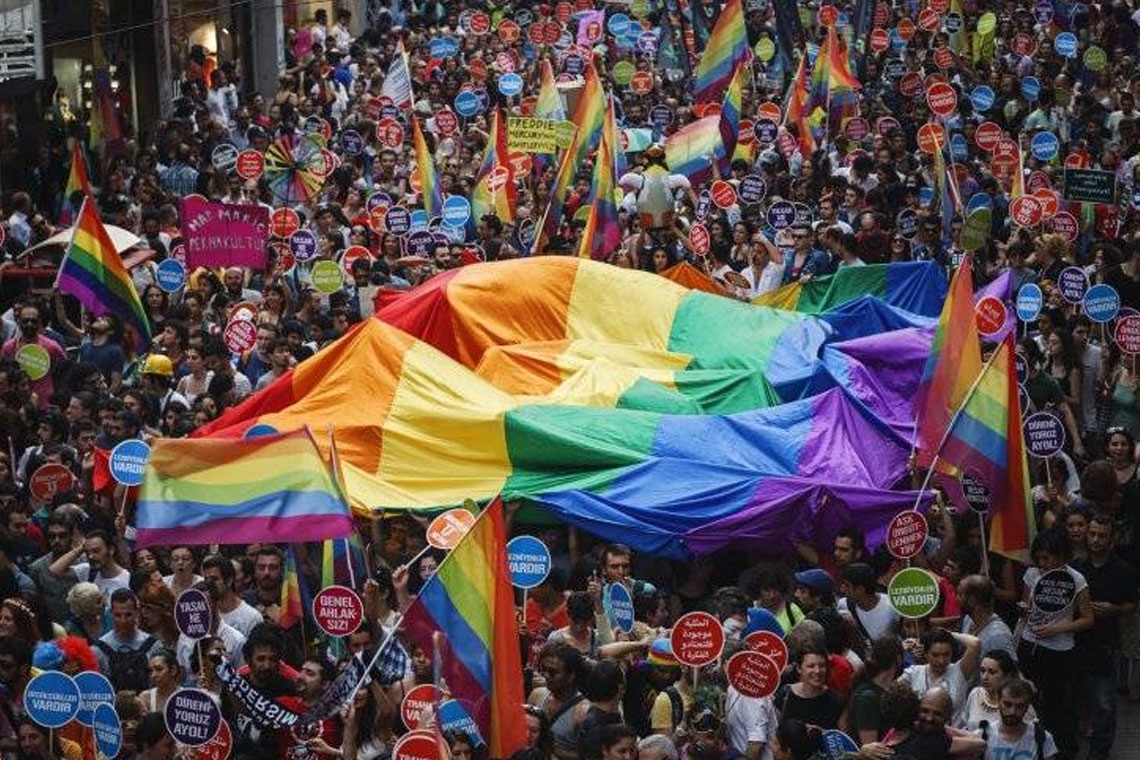By YILDIZ TAR
Since 2015, when the tradition of banning Pride Marches began, taking to the streets for a day each year to celebrate existence and demand rights has turned into a game of hide and seek. In the first banned march in 2015, some participants lost their eyesight due to sudden police attacks during the Istanbul LGBT+ Pride March.
In the following years, police violence followed bans in almost every city, starting with Istanbul. LGBT+ rights advocates had to come up with creative methods to march and avoid police brutality, from announcing "We are dispersing" and reading press statements simultaneously across the city to keeping meeting points secret.
We often praised these methods as creative remnants of the Gezi resistance. Undoubtedly, all the Pride marchers who found alternative ways to take to the streets and demand their rights despite the oppression deserve the highest praise.
However, it’s past time to question the necessity of finding these new methods out of habit. For that, we need to go back to the basics:
Why must people wanting to march and make a press statement tread so carefully? Why does the most ordinary activity, such as a Pride March, turn into an athletic contest requiring somersaults? And more importantly: What are these bans concealing?
A few weeks ago, Besna Tosun from the Saturday Mothers/People was a guest on the Söz Hakkı program. While discussing their encounters with police violence every Saturday while trying to make a press statement at Galatasaray Square, she said, "We want this square fight to end." She explained that being detained weekly prevents them from discussing their main issues, and this impunity and disappearances are being covered up in this way.
The same is now true for Pride Marches. Pride Marches have turned into images and videos of people evading police to march, rather than highlighting the profound press statements and demands of the LGBT+ community. Journalists, whether in the field or at their desks, can no longer focus on the content of the press releases, as they are too busy documenting police violence, tracking the number of detentions, and investigating whether there was mistreatment or torture in custody. Last year, this included following the fate of detained migrants in deportation centers.
But it wasn’t always like this. Anyone old enough to remember and participate in pre-2015 Pride Marches recalls the joy and the debates around the themes of Pride Week.
Just like the Saturday Mothers, the bans have taken away our joy, our demands, our agendas, and our politics. The LGBT+ struggle has been squeezed between Law No. 2911 and politicians' hate speech. Clearly, the government and local bureaucrats intend to maintain this stalemate.
Overcoming this impasse shouldn't be expected from Pride marchers alone. Increasingly isolated every year, they are doing all they can. This year, as in the Ankara Pride March, they gathered without sharing the location publicly. In the Eskişehir Pride March, they faced police violence while trying to meet. During the Istanbul Trans Pride March, they made statements and hung flags in small groups at different points.
So, what is the political and social opposition doing?
Apart from the support statements and the presence of some MPs at the Pride Marches, the answer is: not much beyond becoming accustomed to police violence.
Yet, opening this path and freely shouting one’s demands relies on solidarity and not being left alone. Is it too much to expect the political agenda to at least ask, "Why is this march being blocked?" given that a march has been obstructed for so many years in this country?
I don't think so. On the contrary, without this, neither normalization nor solving these festering issues is possible.
Last year, 154 journalists issued a joint statement saying, "We no longer want to write news of violence and bans against LGBT+s." A year has passed, and we continue to write about violence throughout the year and bans during Pride Month. When truth is limited to violence and bans, it's hard to write about anything else. Apart from a few timid and sparse statements, when it comes to politics and LGBT+s, what we write about is mostly the hate speech from the government and its partners.
And our impasse stands in the middle of the room like an elephant: Defending the right to expression, organization, assembly, and demonstration, even stating that such a right exists, and addressing what the LGBT+ community wants to express through Pride Marches. It’s sad to know that before 2015, we were in a position to loudly and boldly voice our demands everywhere.
From what I see and observe, the LGBT+ movement is trying to build its discourse and politics. Those outside, around, or on the periphery have a historic opportunity to break this impasse that has turned into a Gordian knot. Why not make this Pride Month an opportunity for everyone to shout simple truths from wherever they are as much as they can?



